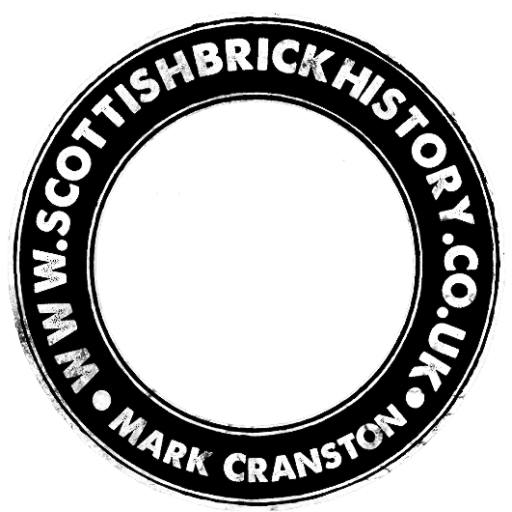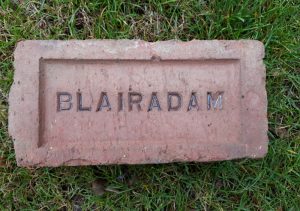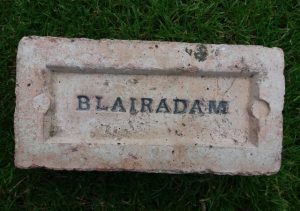The following transcript is from an oral interview taken by Margaret Bennett from Marion Kelly who used to work at the Blairadam brickworks. This was taken as part of the Grace Notes Scotland project.
Grace Notes Scotland is dedicated to identifying and handing on traditions to new generations. All of our projects document (whether in written or oral form), conserve, nurture and promote Scotland’s languages and dialects, traditions and skills, oral history, songs, tunes and stories.
Informant(s): Marion Kelly (MK) and Mary Murphy (daughter)
Place: Kelty (93 Centre St.)
Date: 18/12/2015
Fieldworker(s) Margaret Bennett and Lyn Reilly (age 15)
Original format: Edirol digital mic
Transcription: Michelle Iona Melville
Copied to CD
MB: You were saying that you worked in a brickworks one time
MK: Aye ….
MB: Which one?
MK: Blairadam. It’s closed now. I think all the brickworks are closed aren’t they?
MB: Yes they are, all closed everyone. So what stage in your life was the job in the
brickworks?
MK: I was married when I worked in the brickwork, I was married and had just come to
live in Kelty and my husband’s sister and I worked there. It was good, it was good in
the brickwork….. And we had dungarees, you were supplied with dungarees, aye
MB: Yes, was that quite a novelty to you, having dungarees?
MK: Aye
MB: Because actually, I don’t know if I’m right in this but your generation women didn’t
really wear trousers just as much as they did at that time.
MK: That’s right
MB: It was always dresses and skirts, wasn’t it?
MK: Aye
MB: Yes and so this would be a novelty, dungarees that was really quite daring
MK: Aye
MB: … I’ve no idea what kind of work you’ll be doing so would you be able to, what was
it like?
MK: It was when the bricks come out of the machine, do you know when they were just
being made, they were soft and they come out of the machine
MB: Was that like a mould?
MK: They were moulded but they come out of the machine just as bricks but they were
black and you put them on to a trolley, you had a trolley sitting at the machine so you
lifted them, there was one at each side lifting them onto the trolley and then they were
taken from there to the kilns where they were fired
MB: What did they feel like, they were heavy then?
MK: They were heavy and soft.
MB: Yes
MK: They were actually soft and black.
MB: Now if you lifted them would you make fingerprints in them?
MK: I suppose you could have made fingerprints in them.
MB: If you squeezed too hard?
MK: Aye, you had to handle them you know so you wouldnae
MB: Yes, and did you do that with your bare hands?
MK: Uh-huh, aye
MB: Yes. I was trying to think how you’d lift them out like with a kind of fish slicer, but
no with your bare hands?
MK: Yes
MB: You must have handled thousands a day?
MK: Loads of bricks, aye
2
MB: Standing?
MK: Aye. And then other girls, they went in and they had to build them up in the kilns, do
you know the … in there?
MB: Yes
MK: To build them up, they had a certain way of building them and they had to be perfect
or they werenae accepted, they had to re-do it so it was quite skilled the ones that were
building the wall thing you know and then the kiln got closed, you know they boarded
it up and then they were fired in the kiln
MB: Were the bricks stamped?
MK: Aye they had Blairadam on them
3 min:
MB: Yes, with a stamp on each one?
MK: That’s right, aye
MB: Blairadam
MK: Mrs Adam has one at her door up at Blairadam house ….
MB: Where is Blairadam in relation to here in Kelty?
MK: It’s just up by the woods, you know you go down into Maryburgh and it’s off
Maryburgh and to the big house
MB: Were you living in this house then?
MK: Ah, ah. … No I wasnae in this house, we were in the terrace and then we were in 91
Centre street…
MB: Not so far and did you walk to work?
MK: Yes, we walked, we walked through, they’ve got a park now, Blairadam Park and that
was it, but it was just a wood that you kind of walked through to the brickwork
MB: How long did that take in the morning?
MK: It didnae take you very long, maybe twenty minutes …
MB: Yes, it was over a mile then?
MK: It’s a good wee bit, aye
MB: Yes, every morning, rain, hail or shine. …
MK: We didnae have baths or anything like the pits had, just went hame and got washed
MB: Was it dirty work?
MK: It wasnae awfully dirty but there was a certain amount of dirt
MB: Yes, and would you leave the dungarees there or change?
MK: No, you come home with the dungarees
MB: Wearing the dungarees?
MK: Aye
MB: Any particular footwear?
MK: No we just had our own boots or shoes, heavy kind of work shoes. You needed good
footwear
MB: To be standing all day?
MK: Aye
MB: That’s quite hard on anybody’s
MK: And we had a wee bothy thing that we used to sit in and have our cup of tea at the
break time, we didn’t have flasks and everything else but there was a woman there she
made tea in the wee bothy and she, if you needed anything out the shop for your break
she got it for us, she went to the shop and got everybody’s stuff.
MB: And did you all sit in the bothy for the tea?
MK: Aye for our tea, at the break
MB: And your lunch?
MK: Well we didn’t have a lunch, just a tea break
3
MB: A tea break. Do you mean you worked straight through and no lunch?
MK: You could have pieces with you an that
MB: Did you not do that?
MK: Aye, you took pieces with you to have with your cup of tea
MB: Oh ye so that was like a break
MK: And then she would bring you a biscuit ….
MB: That was the break. Just one break, it was really for you piece in the middle of the
day
MK: Aye
MB: Did you have a favourite piece that you made?
MB: No really, na. Corned beef or something…
MB: Where you making them for your husband anyhow cause he was, was he taking
pieces?
MK: Aye, he’d a piece, aye
MB: In the special tin they used to have to take down the pit?
MK: Aye that’s right. He wasnae keen on bread in the pit an he took some bread but he
used to like ginger bread with a bit butter on it
MB: Did he?
MK: Aye he preferred a bit of ginger bread to bread for his work
MB: Yes, maybe he needed a bit of energy. And water or tea?
MK: He took water
MB: Yes, …. no use taking something you couldn’t keep hot
MK: Aye
MB: Maybe dusty though. Was it dusty in the brickworks?
MK: It wasnae too dusty no, no it wasnae. It wasnae no dusty but it wasnae bad like
MB: I’m trying to picture this, was it a whole lot of women working together or was it just
two or three?
MK: No there was quite a lot of women, quite a lot of women
MB: Like a conveyor belt?
MK: Aye, quite a lot of women there and then, but the bosses were men
MB: Wouldn’t you know! And did you get chance to chat while you were working?
MK: Oh aye, aye. We’d blether away, aye
MB: So that would be nice though, the girls together chatting. That always makes it
worthwhile doesn’t it?
MK: Aye that’s right
MB: So all women except for the bosses, we get the picture. And the ones who worked in
the kiln, now they’re putting them in, what about the ones taking them out ….?
MK: No, I think it was just the women that took them back out
MB: The same ones?
MK: It wasnae the same girls as built them up in the kiln. When they were ready for using,
going to firms you know how the firm, the lorries used to come for the bricks from all
the different places, I don’t know where they all went but I suppose they went all over
the country
MB: And working in the kiln now that would be quite warm?
MK: Oh very warm, really warm, it’s like an oven
MB: Yes, nice in the winter mind. What about where you were working, … what was the
temperature like there?
MK: That was just out in the open.
MB: Out in the open!
MK: Aye, you were out in the open
4
MB: In the winter as well?
MK: Uh-huh
MB: Oh Marion were you not freezing?
MK: No really, no
MB: Cause you were busy?
MK: Uh-huh, and you had a jersey under your dungarees and whatever ay
MB: So if it’s in the open, what about when it was raining?
MK: You just had to work
MB: Gosh and get drookit?
MK: Uh-huh …
MK: I don’t remember getting soaked funny enough, very often
MB: No, the sun shone then. And I hope the pay was reasonable?
MK: It was quite good, I don’t remember what the pay was but it was quite a decent wage
and actually after I had left the brickwork I got money that I didnae know I was
getting, about sixteen pound but it was holiday pay and they sent me that after I had
left the brickwork
MB: Well it was quite a nice gesture, or a nice surprise. It would always come in handy?
MK: It was a big surprise
MB: That would have been what, thirty, forty years ago, or more?
MK: More now
MB: Maybe fifty years ago?
MK: Because I left to have Elizabeth and she’s sixty-two
MB: Well in that case its sixty odd years ago?
MK: Aye
MB: Well sixteen pounds sixty years ago was a lot of money
MK: It was a lot of money, aye
MB: Oh yes, oh well I’m glad you got that. I think it sounds as if you deserved it, don’t
you think so. I believe you’d be tired at night?
MK: Oh aye it was tiring …
MB: But being a woman and married you’d have to come home and start cooking,
cleaning, ironing, washing, mending, all of that. They don’t do the ironing and the
mending now do they?
L?: No
MK: There’s no so much mending done now I know that like but there used to be darning
an that
MB: We always had mending to do, didn’t we?
MK: Aye
MB: You’d mend your stockings and your socks and always something needed sewing
MK: Now they just get thrown out.
MB: I know. You certainly had a very interesting life and hard work, very hard work. Do
you want to ask anything, Lynn?
L?: Was it like hard going out like every day?
MK: It was hard enough but it wasnae like you would’t say oh I’m too tired to go that, you
went, you felt fine, you were younger too, you know so you didnae feel oh I’m awfy
tired, even coming home you didn’t say oh I’m really, really tired, you were tired
enough
MB: And you were still working when you were pregnant?
MK: Uh-huh
MB: Yes, she was expecting her baby and working
MK: That’s right
5
MB: But it all helped to support the family
MK: Ah, ha
MB: … Nobody had a big lot of anything did they?
MK: No
MB: No, we were the same. But somehow, would you say that you didn’t actually feel that
you were short of things did you?
MK: No
MB: Not really?
MK: No, I don’t think so
MB: You didn’t expect more?
MK: No. I think if you had enough to do ye, you didnae think you were sore done tae, you
were quite happy if you had enough to get by
MB: And in those days did you have any machines? Did you have a washing machine in
those days?
MK: No
MB: Just everything by hand, in the scrubbing tub?
MK: And I had, like even when I was in this house I didnae have a washing machine and I
had a good few bairns, but I had a wringer. You know a wringer?
MB: Yes I do
MK: I had a double sink
MB: A double sink, yes and a scrubbing board?
MK: A scrubbing board aye
MB: A washboard, do you know what that’s like? It’s a board with ridged, it’s either glass
or metal and it’s about that long, eighteen inches, a foot
MK: Zinc, it was zinc
MB: Zinc, and you put the soap on the clothes and you rub them with your knuckles on the
board
MK: To get them clean
MB: Everything to clean them, everything and it worked very well but it was hard work
MK: Aye, cause you see the coloured people how they used to do it on a big stone in the
water mind, then they rubbed them on a big stone
MB: Oh did they! You certainly worked hard and so you’d sleep well at night …
Marion…?
MK: Oh aye
MB: Different expectations then though wasn’t there?
MK: Oh, aye. It’s a different life altogether, aye
MB: A different world, ye it is. Do you think it’s improved?
MK: Well, to a certain extent it is improved, but in other ways it’s no as good as it was. It’s
no as good as it was.
MB: Would you want to tell Lynn in what ways is it not so good?
MK: I don’t know, there’s no the closeness of people because I think people are more apart
now you know. More women go out working and everything now
MB: Yes, or even getting together, like this, there’s something really nice about it and
people of different ages. We don’t do enough of it.
MK: I know
MB: Yes, I would say there was a nice sort of, as you say, ‘together feeling’ that people
looked out for one another, shared things
End of recording







